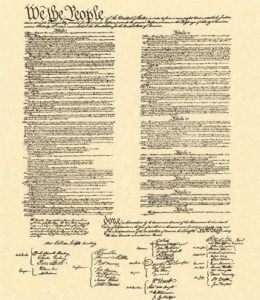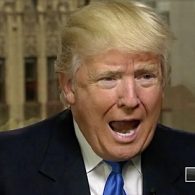
In the aftermath of the November presidential election, Towleroad is exploring several legal issues related to the result, the incoming administration, and the future of democracy in America. If you have any questions, please email law@towleroad.com.
So far, we have discussed how the Electoral College was created to protect slavery. We then discussed the slim chances of getting rid of the institution any time soon.
That said, there is a chance the Electoral College could refuse to make Donald Trump president. How could that happen? What would happen next?
Electors are selected during a two stage process. First, state parties select a slate of Electors. They are usually party leaders, members of organizing committees, and other state politicos. They are “assigned” as Electors for their party's candidates. Second, the voters in each state vote for president and vice president and the Electors of the candidates that win are sent to the Electoral College meeting.
 This is how it works in all states except in Nebraska and Maine, which have proportional distribution of Electors. In those states, the state winner receives two Electors and the winner of each congressional district (who may be the same as the overall winner or a different candidate) receives one Elector.
This is how it works in all states except in Nebraska and Maine, which have proportional distribution of Electors. In those states, the state winner receives two Electors and the winner of each congressional district (who may be the same as the overall winner or a different candidate) receives one Elector.
The Constitution does not require Electors to vote for the winner of the popular vote in their states. The Twelfth Amendment, which replaced Article II, Section 1, Clause 3 of the original Constitution but retained the Electoral College as an institution, does not limit whom Electors can select. Nor is there any federal law that constrains them. The Supreme Court has held that states and state parties can reasonably limit the freedom of Electors: parties can extract commitments and state legislatures can pass laws. Some of these laws, for example, require their Electors to vote for the winner of the national popular vote. As we discussed last time, if enough states pass such laws, the Electoral College would still exist, but would be effectively a rubber stamp of the national popular vote.
No Elector has yet been punished or prosecuted for violating the will of their state's voters.
 If enough Electors vote against Trump (they need not vote for Hillary Clinton) to deny him 270 votes, the election will be tossed to the House of Representatives, which chooses from the top three Electoral College vote getters. Each state gets one vote. The Senate would select the Vice President, with each Senator getting one vote. If the House of Representatives fails to elect a President by Inauguration Day, the Vice-President Elect will serve as acting President until the deadlock is resolved in the House. There are more states with majority Republican Representatives, which would still give the election to a Republican. But they too need not vote for Donald Trump. They could vote for anyone. They won't, as Republicans have proven themselves weak, venal, and power hungry, but they could.
If enough Electors vote against Trump (they need not vote for Hillary Clinton) to deny him 270 votes, the election will be tossed to the House of Representatives, which chooses from the top three Electoral College vote getters. Each state gets one vote. The Senate would select the Vice President, with each Senator getting one vote. If the House of Representatives fails to elect a President by Inauguration Day, the Vice-President Elect will serve as acting President until the deadlock is resolved in the House. There are more states with majority Republican Representatives, which would still give the election to a Republican. But they too need not vote for Donald Trump. They could vote for anyone. They won't, as Republicans have proven themselves weak, venal, and power hungry, but they could.
Electors are not robots. They are human beings, selected first by state parties and then on Election Day. And they are under no Constitutional or federal statutory obligation to vote for a particular candidate. They could vote their conscience. They could vote for Micky Mouse. They could vote for a compromise candidate. They need not vote. So-called “faithless” Electors are anything but; they are charged with electing an independent, unbiased, qualified steward of the state, one who is free of foreign influences and one most capable to lead the entire country. Donald Trump is none of that. He is utterly unqualified and, as it increasingly seems, a willing puppet of Vladimir Putin. Electors can stop him.
 Donald Trump is poised to assemble a cabinet of radical conspiracy theorists. His proposed EPA Administer does not believe in climate change. His proposed Secretary of State has deep ties to Russia, and was even honored by the Russian government for service to the state. His proposed Veterans Administration head has no experience running an agency. His proposed Secretary of Education thinks transgender persons are diseased, opposed marriage equality, and doesn't even believe in public education. His Attorney General nominee was considered too racist for a federal judgeship. Donald Trump's administration will be the real life example of the fox in the hen house. And it doesn't stop there.
Donald Trump is poised to assemble a cabinet of radical conspiracy theorists. His proposed EPA Administer does not believe in climate change. His proposed Secretary of State has deep ties to Russia, and was even honored by the Russian government for service to the state. His proposed Veterans Administration head has no experience running an agency. His proposed Secretary of Education thinks transgender persons are diseased, opposed marriage equality, and doesn't even believe in public education. His Attorney General nominee was considered too racist for a federal judgeship. Donald Trump's administration will be the real life example of the fox in the hen house. And it doesn't stop there.
Trump's conflicts of interest are staggering. He will be in violation of the Constitution the moment he takes office because he refuses to entirely divest from his businesses, a problem we will discuss in the next few weeks. He used unsecured phone lines to call heads of state and lobbied for his business partners and construction projects. He broke decades of diplomatic protocol, spoke to the head of Taiwan, and risked upsetting a delicate balance in the South China Sea. He took to Twitter to attack a union leader and a young woman who criticized him. He lies with impunity. And he hasn't even taken office yet.
That said, it is unlikely there will be enough “faithless” Electors to deprive Donald Trump of the Presidency. But as his ties to Russia become more clear, as it becomes evident that Vladimir Putin hacked the Republicans to hold sway over them, as it grows increasingly clear that Trump is planning to earn billions for his businesses over the next four years at the expense of the American people, and as it becomes evident that he will be much more like Robert Mugabe than George W. Bush, Electors have a responsibility to deny power to this existential threat to democracy and democratic values.



